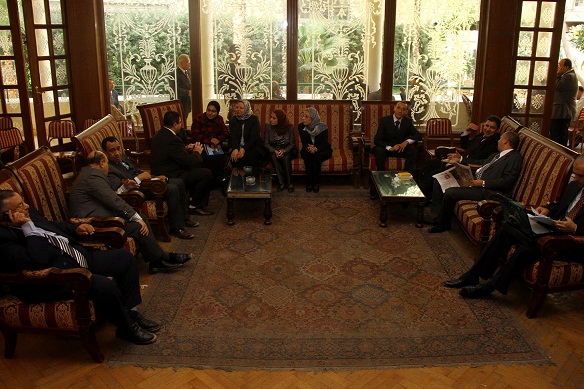
Egypt’s highest court has announced an open-ended strike in response to President Mohamed Morsy’s constitutional declaration.
The Cassation Court, which sits atop of the judicial hierarchy, held a general assembly meeting Wednesday and voted 270 to 19 to suspend work until Morsy rescinds his decree.
The court’s chairman, Mohamed Motaz Motwaly, is also the chairman of the Supreme Council of the Judiciary.
The council met Morsy on Monday to discuss the decree after Egypt’s judges held a general assembly meeting of the national Judge’s Club and opposed his declaration.
Presidential spokesperson Yasser Ali said after the meeting that the judges had been convinced to agree to the decree, as long as only “acts of sovereignty” were above judicial review.
Members of the council refuted Ali’s claims at the time and said they had not reached consensus with the president and are still demanding he revoke his decree. Today’s vote at the Cassation Court affirms this.
The Cassation Court is joined in the strike by Egypt’s eight appeals courts in Cairo, Alexandria, Tanta, Mansoura, Ismailia, Beni Suef, Assiut and Qena. The country’s 26 primary courts, the courts of limited jurisdiction and most prosecution offices, are also striking, a representative of the Judges’ Club said.
The constitutional declaration protects presidential decisions from judicial review. It also makes the Constituent Assembly tasked with drafting the new constitution and the Shura Council, parliament’s lower house, impervious to dissolution by courts.
The decree has also allowed Morsy to dismiss former Prosecution General Abdel Meguid Mahmoud and replace him with Tala’at Abdallah, who Morsy chose unilaterally.
Judges see the decree as an attack on the independence of the judiciary but the president says it was necessary in order to protect the revolution from corrupt individuals in the judiciary.
With the Cassation, appeals, primary and limited jurisdiction courts on strike, the entire ordinary judiciary of Egypt has come to a standstill.
Egypt has a dual judicial system of ordinary and administrative courts.
The State Council, which includes the Supreme Administrative Court, the administrative judiciary courts and all lower administrative courts, said it was also against the decree but that its courts would not go on strike.
The administrative courts are the ones that will handle any cases against the decree and as such will continue to operate.
The Supreme Constitutional Court, a special court tasked with ruling on the constitutionality of laws, released a statement on Wednesday rejecting the decree, saying it was a campaign against the court led by President Morsy.
All civilian courts have now announced their rejection of the decree in one way or another.
The Supreme State Security Court and other state security courts and prosecution offices are operating as usual, however.
The military judiciary has made no comment on the decree. Both state security and military courts are unaffected by the constitutional decree and are not represented in the Supreme Council of the Judiciary.



